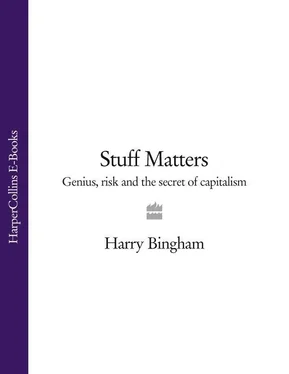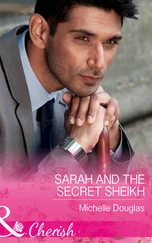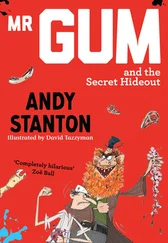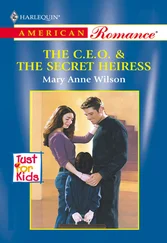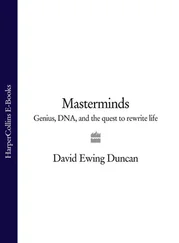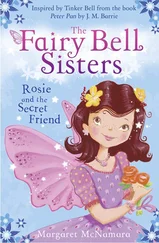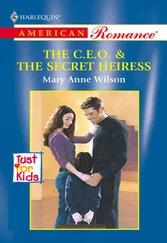This book is the outcome of that exploration. The businessmen and women I’ve spoken to have led companies collectively worth hundreds of billions of dollars. The bankers I’ve spoken to have handled well over a trillion dollars’ worth of mergers and acquisitions transactions and have invested uncountably huge sums on the world markets. But I’ve also met some of the little guys; the ordinary people doing ordinary jobs who nevertheless play their own crucial part in keeping this precarious alchemy afloat. In short, I wanted to find out about everything an economics degree does not cover, that ten years in the City never gets close to.
I still don’t know how to refine oil, smelt metals, extrude plastic, etch silicon, write program codes, or do any other of those fine things that makes Kat’s world the rich and prosperous world it is. But I do now have an almost bodily sense of how the whole thing hangs together. I’ve learned how extraordinarily commonplace financial crises are and how the miracle of capitalism goes on happening nevertheless.
And my journey, unexpectedly, has gone further than that. It’s all very well going places and meeting people, but I came to see that the alchemy of wealth happens inside each of us as well. We have strong feelings about money. We are alternately avaricious and ostentatious, greedy and generous, fearful and optimistic. My journey to the land of money wouldn’t have been complete unless it stepped inside our own hearts and minds, our own hubbub of powerful emotions.
This book offers an account of my travels. It’s given me a sense of the alchemy that turned our world from what it was to what it is, a man-made miracle of creation. It’s also taken me to the heart of the paradox that lies at the heart of capitalism, a paradox by which money is both the most important thing there is and something that doesn’t matter an iota. I came to see that economics, as taught at university and as reiterated by any number of economics bestsellers, is a fraud, a subject that purports to explain everything but doesn’t even understand the thing that lies at its very heart: the human relationship to money.
But those things lie ahead of us, at the journey’s end, not at its start. Because this is a trip that starts the only place it can: in the mind and instinct of the entrepreneur.
PART ONE The Entrepreneur
Men wanted for hazardous journey, small wages, bitter cold, long months of complete darkness, constant dangers, safe return doubtful. Honour and recognition in case of success.
– Advertisement placed by ERNEST SHACKLETON in 1914
It begins with character. Character and a moment of risk.
The risk takes no single form. Perhaps to most of us the moment comes and goes without our even noticing. A conversation overheard; a difficult client with a wild-eyed plan; a death; an idea; a throat irritation.
Most of us, and I include me, look for the life more comfortable. Great wealth would be nice, of course, but we’ve learned by now that wealth doesn’t make home visits. It’s an animal to be hunted, not a guest to be entertained. Our desire for comfort – the regular pay cheque, hearth and home, keeping our capital somewhere safe – may not be an overwhelming compulsion. We may be ocean-sailors at the weekend, even if we’re wage-slaves during the week. But it’s there, the need for security. The poet Philip Larkin called it a Toad, ‘its hunkers…heavy as hard luck, and cold as snow’, a Toad that squats there asking us how we’d feel with our capital committed and our income gone. How we’d feel, talking in the pub with our mates, them with their steady jobs and their career progression, and we with a scheme that looked so smart once and so insanely optimistic now. Accordingly, the moment comes and the moment goes and because we’re not on the lookout for it, we don’t so much as notice its passing.
Most people aren’t like that. One in a hundred? One in a thousand? It’s not that they overcome their Toad, that they wrestle the beast into submission, it’s that they don’t have the Toad at all. William Knox D’Arcy was born to a well-to-do English family in 1849. He was educated at Westminster School, an elite public school located in the rambling embrace of Westminster Abbey, where every British monarch since 1066 has been crowned and the final resting place for seventeen of their kingly souls. In 1866, when their father went bust, the family emigrated to Australia to start all over again. They ended up settling in Rockhampton in Central Queensland, which isn’t exactly a big place now, but back then it must have seemed a million miles distant from the Abbey bells.
The young D’Arcy followed his father into law and joined the family firm. A lifetime of prosperous colonial Toad-following seemed to beckon. Then one sunny day in 1882, three brothers entered D’Arcy’s office. They were rough men, miners, and they had been sent down the road from the local bank. They brought two things, a story and a lump of rock. The story was quickly told. The three men, Frederick, Edwin and Thomas Morgan, had been prospecting for silver in the Dee valley. They had found no silver and, as we now know, there’s no silver there to be found. According to one version of the story, while on the journey back to town, Edwin had felt the call of nature. He walked a little distance from camp and urinated. As he did so, he couldn’t help noticing a peculiar black boulder that had clearly rolled into the valley floor from the slopes above. Being a man and a miner, he idly swung his pick at the stone, thinking no more than that stones were there to be hit and picks had been made to do the hitting. He struck the stone. A chipping flew off and glinted. The rock was – or seemed to be – loaded with gold.
The Morgan brothers believed they had almost literally stumbled on a mountain of money, but they knew they needed help. Legal help, to stake a robust claim. Financial help, to bring capital to bear in exploiting the find. Technical help, to extract rock from the mountain and gold from the rock. Commercial help, to sort out hiring and transport and markets and sales. Their first stop had been the bank, the second stop D’Arcy’s office. (And perhaps it’s worth noting here that there are various different versions of the story in circulation, though the gist of them all is the same.)
Now for just a moment, stop there. Had you been sitting at D’Arcy’s desk that day, gazing out at a dusty street, hearing a commotion outside in the anteroom, seeing these three unconventional clients enter your office, listening to their tale and fingering a tiny chipping of black and gold stone – what would you have done? What would you have said? How would you have proceeded?
Let’s be realistic. At a very minimum, you’d have noticed that you had the scope to charge your services at premium rate. There weren’t so many lawyers in Rockhampton and these three clients were in no position to haggle. If the ore in the rock was gold, then these clients would pay you, and pay you royally, for your legal expertise. That kind of reasoning, however, is amply consistent with being slave to the Toad. No one will pass up a little extra cash, if they don’t have to put anything at risk. So you charge your time at a premium rate, but what else? Do you commit significant time and energy to the project, unsure of whether you’ll receive a penny in exchange? Do you put some of your own money into it and if so, how much?
To answer the question accurately, you need to be careful about details. You are not wealthy. You have a young wife to support. Your start in life accustomed you to a high standard of living and in Rockhampton, Queensland, cash is hard to acquire and easy to lose. I suggest you would do roughly what I would do. Be interested, but evasive. Seek out as many facts as I could, knowing that time is always ticking by and that my main advantage lies in having been just the fifth person in the world to see and handle that little black stone. I’d talk with my wife. Discuss our own capital position, how much we need for the baby, how much we need for our security. Identify a sum that we can afford to gamble. Find a balance between maintaining a regular weekly income and investing time in a scheme that might be hare-brained or might be the best thing we ever did.
Читать дальше
